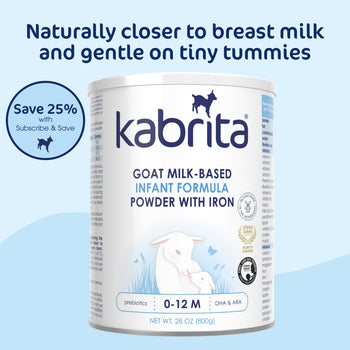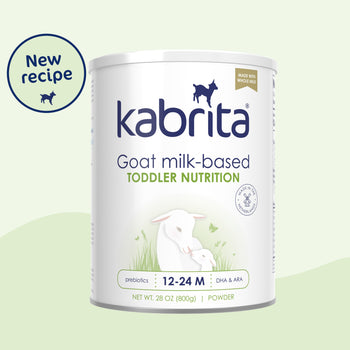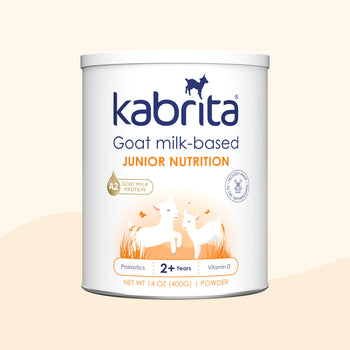Goat Milk Formula Benefits: Why Use Goat Milk Formula?
By Kelsey Kunik, RDN
Registered Dietitian Nutritionist
Choosing the right formula for your baby can feel overwhelming, especially if your little one has a sensitive tummy. While cow’s milk formula has traditionally been used in the United States as an alternative to breastmilk, goat milk formula has quickly gained popularity.
Not only has research found goat milk formula to be safe and nutritionally complete for newborns and babies up to 12 months, but it may also have some advantages over more traditional infant formulas made from cow’s milk.1 Whether your baby struggles with gas, colic, or allergies, or you’re looking for an infant formula that’s as similar to breastmilk as possible, goat milk formula may be an optimal choice.
Keep reading to learn more about the benefits of goat milk formula and why parents and experts are turning toward this nutrient-rich and easily digestible formula for babies.
Table of Contents:
What are the benefits of goat milk formula?
What are the benefits of goat milk formula?
Goat milk formula is a nourishing alternative or addition to breastmilk that may have some potential advantages over traditional cow milk formula. Here are some of the reasons you may want to choose goat milk formula for your baby.
Gentle on the digestive system
While cow milk, goat milk, and human milk all have high-quality protein to help nourish your little one, research has found that goat milk formula and human breastmilk are digested at similar rates, while the protein in cow milk formula takes longer to break down and digest.2
Good source of prebiotics
Goat milk naturally has up to 10 times more oligosaccharides than cow milk.3 Oligosaccharides form prebiotic fibers in the digestive tract that help to strengthen your baby’s gut microbiome, feeding the good gut bacteria and helping to crowd out and inhibit pathogens.4
Rich in nutrients
Goat milk is naturally rich in high-quality protein, short and medium-chain fatty acids, and a number of essential vitamins and minerals.5 Goat milk formula available in the United States meets the Food and Drug Administration (FDA) requirements for infant formula with optimal amounts of all 30 required nutrients.6 A study comparing the nutritional status of infants fed goat milk formula versus infants fed cow milk formula found no difference between the two groups.7 Kabrita goat milk formula is the first European infant goat milk formula to meet all FDA requirements.
Proteins are similar to breastmilk
“Goat milk protein naturally contains more beta-casein, which is found in human milk, and less Alpha-S1 casein, which is a key component of cow milk protein. This combination makes goat milk protein more easily digested, and you can see the difference,” says Ari Brown, MD, FAAP.
Supports regular, soft bowel movements
Babies fed formula often have less frequent bowel movements and are more likely to struggle with constipation. This can happen thanks to the difficulty their young digestive system has in absorbing the fat in formula and the formation of insoluble calcium fatty acid soaps in the stool.8 Goat milk formula may help keep their stool soft and regular, thanks to the specific type of fatty acids and proteins found in it.
One study found that infants fed goat milk formula had similar frequency and consistency of bowel movements to breastmilk-fed babies compared to those fed cow milk formula, who had slightly less frequent and firmer stool.9
Why use goat milk formula?
One glance down the formula aisle, and it’s no surprise if you’re confused about what the best formula for your baby is! With so many options to choose from, it can be overwhelming to decide on the best source of nourishment to help your little one grow. While goat milk formula is an excellent option to start with, there are a few reasons parents are switching to goat milk formula more and more once learning goat milk formula benefits.
Transitioning from breastmilk to formula
Transitioning your baby from breastmilk to formula, should you decide or need to stop breastfeeding or pumping, can bring up a lot of emotions for your family and sometimes lead to tummy troubles for your little one. Dr. Brown recommends goat milk formula for any baby, including those who are transitioning from breastmilk to formula, as it’s naturally gentle and easy for babies to digest.
A traditional formula isn’t working
For babies using traditional cow milk formula struggling with digestive issues like gas, constipation, or overall fussiness, goat milk formula may help alleviate some of their discomforts. “Goat milk protein is naturally more similar to human milk protein, and as a result, babies have fewer issues with discomfort,” says Dr. Brown. Research has found that many of the benefits of goat milk for babies stem from the fact that the proteins in goat milk are more easily digested than the protein in cow milk.10
The lower level of lactose and smaller fat globules may also help your baby digest goat milk formula more easily than cow milk formula. “The only time I cannot recommend it is for the 3% of babies with a milk protein allergy *CMA *CMPA *FPIAP. Babies who suffer from milk protein allergy can experience symptoms with any mammalian milk (cow, goat, sheep, camel, etc) or soy protein,” says Dr. Brown.
You need formula to supplement breastmilk
If you’re looking for a formula to supplement your breastmilk, goat milk formula is an excellent option. Dr. Brown recommends it for formula-fed or combo-fed babies, highlighting that the American Academy of Pediatrics also offers it as a first-time nutritional option for a baby’s first year.11 Goat milk formula is nutritionally complete, providing everything your baby needs to thrive when you turn to combo feeding.
Goat Milk Formula FAQs
How do you transition a breastfed baby to goat milk formula safely?
“It makes sense to incorporate one or two formula feedings a day and gradually add more depending on if you plan to combo feed, or wean your baby from breastmilk,” says Dr. Brown. Transitioning slowly helps your baby’s digestive system get used to the new formula for the least amount of discomfort.
Does goat milk formula help with gas and colic?
“Goat milk protein naturally contains more beta-casein, which is found in human milk, and less Alpha-S1 casein, which is a key component of cow milk protein,” says Dr. Brown. “This combination makes goat milk protein more easily digested and you can see the difference,” she adds.
Is goat milk formula better than cow milk formula?
Both goat milk formula and cow milk formula can meet your baby’s nutritional needs and help them grow and thrive during the first year of life. The main advantage of goat milk formula is its similarities to breastmilk which helps many babies tolerate it better than cow milk formula.
Why switch to goat milk formula?
Switching to goat milk formula from traditional formula may help alleviate digestive symptoms in some infants with sensitive tummies as its composition is closer to breastmilk and may be easier for babies to digest.
Is goat milk formula easier to digest?
Yes, goat milk formula is easier to digest than cow milk because the proteins in goat milk are digested more easily and quickly than the proteins found in cow milk.
Whether you breastfeed, combo feed, or use cow or goat milk formula to feed your baby, you’re doing an amazing job. Choosing the right formula can be a stressful decision for any new parent, but having options like Kabrita Goat Milk formula for your baby, especially if they have a sensitive tummy, makes it a little easier. While goat milk formula is only just becoming popular in the United States and Canada, it’s been widely used throughout the world as a gentle and complete formula to nourish babies during the first year of life.
References
- Jankiewicz, M., van Lee, L., Biesheuvel, M., Brouwer-Brolsma, E. M., van der Zee, L., & Szajewska, H. (2023). The Effect of Goat-Milk-Based Infant Formulas on Growth and Safety Parameters: A Systematic Review and Meta-Analysis. Nutrients, 15(9), 2110.
- Maathuis, A., Havenaar, R., He, T., & Bellmann, S. (2017). Protein Digestion and Quality of Goat and Cow Milk Infant Formula and Human Milk Under Simulated Infant Conditions. Journal of pediatric gastroenterology and nutrition, 65(6), 661–666.
- Prosser, C. G. (2021). Compositional and functional characteristics of goat milk and relevance as a base for infant formula. Journal of Food Science, 86(2), 257–265.
- van Leeuwen, S. S., Te Poele, E. M., Chatziioannou, A. C., Benjamins, E., Haandrikman, A., & Dijkhuizen, L. (2020). Goat Milk Oligosaccharides: Their Diversity, Quantity, and Functional Properties in Comparison to Human Milk Oligosaccharides. Journal of agricultural and food chemistry, 68(47), 13469–13485.
- Xu, M., Wang, Y., Dai, Z., Zhang, Y., Li, Y., & Wang, J. (2015). Comparison of growth and nutritional status in infants receiving goat milk-based formula and cow milk-based formula: a randomized, double-blind study. Food & nutrition research, 59, 28613.
- Program, H. F. (2024, August 14). Infant Formula. U.S. Food And Drug Administration.
- Zhou, S. J., Sullivan, T., Gibson, R. A., Lönnerdal, B., Prosser, C. G., Lowry, D. J., & Makrides, M. (2014). Nutritional adequacy of goat milk infant formulas for term infants: a double-blind randomised controlled trial. British Journal of Nutrition, 111(9), 1641–1651.
- Quinlan, P. T., Lockton, S., Irwin, J., & Lucas, A. L. (1995). The relationship between stool hardness and stool composition in breast- and formula-fed infants. Journal of pediatric gastroenterology and nutrition, 20(1), 81–90.
- Han, Y., Chang, E. Y., Kim, J., Ahn, K., Kim, H. Y., Hwang, E. M., Lowry, D., Prosser, C., & Lee, S. I. (2011). Association of infant feeding practices in the general population with infant growth and stool characteristics. Nutrition research and practice, 5(4), 308–312.
- Hodgkinson, A. J., Wallace, O. A., Boggs, I., Broadhurst, M., & Prosser, C. G. (2017). Gastric digestion of cow and goat milk: Impact of infant and young child in vitro digestion conditions. Food Chemistry, 245, 275–281.
- Choosing a baby formula. HealthyChildren.org.



